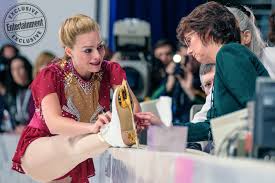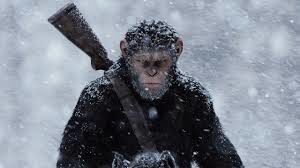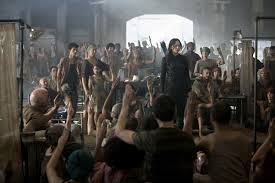REEL MOTHERS: Movie reviews of I, Tonya, Three Billboards Outside Ebbing, Missouri by Howard Casner
Posted: December 14, 2017 | Author: Donald | Filed under: Uncategorized | Tags: Allison Janney, Craig Gillespie, I, John Hawks, Lucas Hedges, Margot Robbie, Martin McDonagh, McDormand, Missouri, Paul Walter Hauser, Peter Dinklage, Sam Rockwell, Sebastian Stan, Steven Rogers, Three Billboards Outside Ebbing, Tonya, Woody Harrelson, Zeljko Ivanek | 728 Comments » First, a word from our sponsors: I am now offering a new consultation service: so much emphasis has been given lately to the importance of the opening of your screenplay, I now offer coverage for the first twenty pages at the cost of $20.00. For those who don’t want to have full coverage on their screenplay at this time, but want to know how well their script is working with the opening pages, this is perfect for you. I’ll help you not lose the reader on page one.
First, a word from our sponsors: I am now offering a new consultation service: so much emphasis has been given lately to the importance of the opening of your screenplay, I now offer coverage for the first twenty pages at the cost of $20.00. For those who don’t want to have full coverage on their screenplay at this time, but want to know how well their script is working with the opening pages, this is perfect for you. I’ll help you not lose the reader on page one.
Ever wonder what a reader for a contest or agency thinks when he reads your screenplay? FosCheck out my new e-book published on Amazon: Rantings and Ravings of a Screenplay Reader, including my series of essays, What I Learned Reading for Contests This Year, and my film reviews of 2013. Only $2.99. http://ow.ly/xN31r
and check out my Script Consultation Services: http://ow.ly/HPxKE
Warning: SPOILERS
 I, Tonya, the new film from writer Steven Rogers and director Craig Gillespie, is a fictional account of the ice skating scandal where the husband of skater Tonya Harding, along with her bodyguard, conspired to break the leg of Tonya’s main rival, Nancy Kerrigan.
I, Tonya, the new film from writer Steven Rogers and director Craig Gillespie, is a fictional account of the ice skating scandal where the husband of skater Tonya Harding, along with her bodyguard, conspired to break the leg of Tonya’s main rival, Nancy Kerrigan.
No matter what else it may be, I, Tonya is very successful and could easily be a real crowd pleaser. Structurally, it’s a forthright dramatization of the events punctuated with talking head interviews of the characters looking back on events. It’s often extremely funny and at times manages to show some empathy for the title character.
Though it is effective, it also at times feels a bit condescending and exploitive, as if the filmmakers were treating this as an elongated Jerry Springer show. So the laughs are sometimes a bit cruel and at the expense of the real life counterparts.
THE APES OF WRATH: Movie Review of War for the Planet of the Apes by Howard Casner
Posted: July 22, 2017 | Author: Donald | Filed under: Uncategorized | Tags: Andy Serkis, Mark Bomback, Matt Reeves, Steve Zhan, War for the Planet of the Apes, Woody Harrelson | 19 Comments » First, a word from our sponsors: I wanted to say thank you to everyone who contributed to our Indiegogo campaign for 15 Conversations in 10 Minutes. We did very well due to you folks. For those who weren’t able to give, keep us in your thoughts. And if you are able to contribute in the future, contact me and I’ll tell you how. I will even honor the perks on the
First, a word from our sponsors: I wanted to say thank you to everyone who contributed to our Indiegogo campaign for 15 Conversations in 10 Minutes. We did very well due to you folks. For those who weren’t able to give, keep us in your thoughts. And if you are able to contribute in the future, contact me and I’ll tell you how. I will even honor the perks on the
I am now offering a new consultation service: so much emphasis has been given lately to the importance of the opening of your screenplay, I now offer coverage for the first twenty pages at the cost of $20.00. For those who don’t want to have full coverage on their screenplay at this time, but want to know how well their script is working with the opening pages, this is perfect for you. I’ll help you not lose the reader on page one.
Ever wonder what a reader for a contest or agency thinks when he reads your screenplay? Check out my new e-book published on Amazon: Rantings and Ravings of a Screenplay Reader, including my series of essays, What I Learned Reading for Contests This Year, and my film reviews of 2013. Only $2.99. http://ow.ly/xN31r
and check out my Script Consultation Services: http://ow.ly/HPxKE
Warning: SPOILERS
 I am well aware as to what the critics and my fellow movie goers feel about War for the Planet of the Apes.
I am well aware as to what the critics and my fellow movie goers feel about War for the Planet of the Apes.
And I don’t care.
As far as I’m concerned, this second sequel and third prequel of the Planet of the Apes franchise written by Mark Bomback and the director Matt Reeves is perhaps one of the worst films of the year. Read the rest of this entry »
NO MORE FUN AND HUNGER GAMES or THE REVOLUTION WILL BE TELEVISED: Movie review of The Hunger Games: Mockingjay-Part I by Howard Casner
Posted: November 28, 2014 | Author: Donald | Filed under: Uncategorized | Tags: Danny Strong, Donald Sutherland, Elizabeth Banks, Francis Lawrence, Jeffrey Wright, Jennifer Lawrence, Josh Hutcherson, Julianne Moore, Liam Helmsworth, Peter Craig, Philip Seymour Hoffman, Stanley Tucci, Suzanne Collins, The Hunger Games: Mockingjay-Part I, Woody Harrelson | 8 Comments »First, a word from our sponsors. Ever wonder what a reader for a contest or agency thinks when he reads your screenplay? Check out my new e-book published on Amazon: Rantings and Ravings of a Screenplay Reader, including my series of essays, What I Learned Reading for Contests This Year, and my film reviews of 2013. Only $2.99. http://ow.ly/xN31r
Warning: SPOILERS
 Okay.
Okay.
How to start.
Well, there’s really no point in putting it off.
At the risk of losing what little reputation I have (if I even have one); at the risk of inviting ridicule, derision, mockery and scorn from those who read my reviews who don’t already hold me in ridicule, derision, mockery and scorn; and at the risk of being reviled by serious filmgoers far and wide…
The Hunger Games: Mockingjay-Part I is not nearly as bad as the critics claim it is and is by far the best entry in the franchise to date, far better than the first two films. Read the rest of this entry »
Movie Reviews of NOW YOU SEE ME and THE HISTORY OF FUTURE FOLK by Howard Casner
Posted: June 15, 2013 | Author: Donald | Filed under: Uncategorized | Tags: April L. Hernandez, Boaz Yakin, David Franco, Ed Solomon, Edward Ricourt, Isla Fisher, Jay Klaitz, Jeremy Kipp Walker, Jesse Eisenberg, John Mitchell, Louis Leterrier, Mark Ruffalo, Melanie Laurent, Michael Caine, Morgan Freeman, Nils d’Aulaire, Now You See Me, Onata Aprile, The History of Future Folk, Woody Harrelson | 23 Comments »Now You See Me is a very enjoyable shaggy dog story about magicians. However, the biggest sleight of hand by writers Ed Solomon, Boaz Yakin, Edward Ricourt and director Louis Leterrier is how they’re able to make the audience overlook what is at times an unconvincing and questionable plot and go along with the often preposterous goings on, and like any spectator at a Las Vegas Show, love every minute of it.
The story opens with four practitioners of the art of prestidigitation receiving mysterious summonses from a total stranger—and they actually show up at the time and place requested—why?, well, you’re so busy looking at everything else going on you don’t notice that there is no convincing reason given. From there it proceeds to a story that too often depends on predicting how people will act in situations where actions of people can’t possibly be predicted. And as a friend pointed out, you would think that if they were as great at the art of illusion as they claim, the group would come up with better getaway plans than simply running away (there’s a lot of running here, more than in an episode of Dr. Who).
But it’s hard to focus on such minor pickinesses when you are caught up in a story that rarely stops to catch its breath; has a plot that is clever and filled with sly and dazzling magic tricks (well, except for whenever hypnosis and mind control is used—these sections never felt convincing); and is headed by a first rate cast who is given a whirlwind of staircase wit in which everybody’s snarky attitude only makes them more ingratiating than alienating.
The gang of four is lead by Jesse Eisenberg as J. Daniel Atlas and you can tell how much Eisenberg’s star has risen in that he plays the magician in the opening with the least interesting magic trick and yet he’s given the most screen time and is made the leader of the act made up of the other three. His manic line deliveries, that are unmistakenly Eisenberg’s and no other, are backed by a Greek chorus made up of Isla Fisher, David Franco and Woody Harrelson, all of whom deliver their lines as if they were acting in a restoration comedy.
Mark Ruffalo uses his hangdog looks to great effectiveness here and elder statesmen Michael Caine and Morgan Freeman do what elder statesmen do—the same thing as the others, but with a lot more ease. Melanie Laurent is also on board. She is given nothing to do and she proceeds not to do it. Well, she is there as the love interest to Mark Ruffalo, but unfortunately, magic can only go so far, and the people involved could never make this part remotely believable.
The Future Folk is a blue grass music duo who dress in space suits pretending to be aliens. They’ve been entertaining bar crowds in NYC for many years now (they have a certain campy quality like that of Flight of the Concords). The movie, The History of Future Folk, is a tongue in cheek “origin” story of the singers and how they came to earth and became musicians. The duo is made up of Nils d’Aulaire (General Trius) and Jay Klaitz (Kevin) and while their music is clever and upbeat and catchy (and not enough of it is played in the film), the movie that’s been made about them (written by John Mitchell and directed by Mitchell and Jeremy Kipp Walker) feels tepid and unimaginative, as tepid and unimaginative as the emotions that register on d’Aulaire’s face.
The basic idea is that a comet is headed toward the Future Folk’s home planet, so Trius is sent to earth to wipe out civilization so his home planet can come and live here; but he is overcome by the beauty of music, something that doesn’t exist on his planet (leading to one of the movie’s more effective campy ideas since the music he hears is the type played in a Target). He decides to stay and become a singer and start a family. The pacing is slow and the plot turns run of the mill (it’s an example of the movie’s clunkiness that you don’t find out until half way through that Trius has been trying to contact his home planet since his arrival, but hasn’t been able to, leaving you to think for the majority of the film that this guy’s a real douche for deserting his planet as it’s about to be destroyed).
The most pleasing performance is probably given by April L. Hernandez as Carmen, who has the perkiness of a Rosie Perez. Her role is to fall for Kevin and only a talented actress could make this remotely convincing (in one scene Kevin paralyzes her with a spray and then kisses her against her will, and no one seems to think there is anything creepy about this). Onata Aprile plays Trius’ earth daughter; she’s the cute as a button little girl in What Maisie Knew.
Movie Reviews of ARGO and SEVEN PSYCHOPATHS by Howard Casner
Posted: October 16, 2012 | Author: Donald | Filed under: Uncategorized | Tags: Alan Arkin, Argo, Ben Affleck, Bryan Cranston, Chris Terrio, Christopher Walken, Collin Ferrell, John Goodman, Martin McDonagh, Sam Rockwell, Seven Psychopaths, Victor Garber, Woody Harrelson | 4,820 Comments »Argo, the new thriller written by Chris Terrio and directed by Ben Affleck, has been described as one of those throw back Hollywood studio movies, one that isn’t based on a franchise or comic book, but is instead a solid, well written, professionally made piece of entertainment aimed at adults. And this is a very accurate description. But at the same time, this also means that it reduces a terrifying and important and politically complex situation to a routine thriller; has jokes that are as old as the Hollywood Hills (though I seemed to be the only one that laughed at the screenwriting/free meal punch line); and has character arcs and plot turns that are obvious and formulaic and have everything but subtlety (and the kitchen sink, I suppose).
But does any of this matter? Does anyone care? It doesn’t seem so. Mainly because it is also highly, if not, incredibly entertaining for the most part (or enough part to make it work very well on its own terms). Indeed, the approach may reduce the circumstances to a Casablanca like simplification, but it doesn’t ignore the historical reality altogether (and gives it more attention and depth than expected). The jokes may be stale, but they are still funny and delivered with the timing of pros. The plotting may be predictable, but it still keeps you on the edge of your seat. And the character arcs may be formulaic, but they still bring a tear to the eye.
So I suppose the conclusion is: go for the entertainment, but leave your aesthetic at the door.
The story revolves around a group of American embassy workers who manage to get out a back door and take refuge in the Canadian ambassador’s home during the 1979 Iran hostage crisis. To rescue these six people before the Iranian government finds them (and most likely would kill them), a CIA agent, Tony Mendez, is assigned to rescue them and he does so by coming up with the “best, worst idea” they have: Mendez will pretend to be a Canadian movie producer scouting locations in Iran and then take the six out with him pretending that they are part of his crew.
There’s nothing that wrong with the movie. It more than gets the job done. And it has some wonderful aspects to it, especially in some of the supporting roles. Alan Arkin plays a once big movie producer now reduced to accepting life time achievement awards and he plays his part as if it’s the role of his life (he may be as old as the jokes, but he makes them zing as if they’ve never been told before). John Goodman solidifies his career as one of our most enjoyable supporting actors as John Chambers, a make up artist who won an Oscar for the original Planet of the Apes movie. Victor Garber takes a nothing role as the Canadian Ambassador and fills it with such humanity, one wants to give him the Nobel Peace Prize. And there’s a scene at the end where the annoying Doubting Thomas/Debbie Downer character, who had bad talked the mission the whole way, fulfills his arc by suddenly becoming more invested in his playacting than the others, describing the fake movie they are not shooting to some Iranian guards as if he was pitching the project that could make or break him (which it could, I suppose).
At the same time, as fun as it is, one does wish it could have been better. The rest of the cast is filled with a bunch of TV actors as if the producers were hoping that casting them alone would cover up a certain flatness in most of the roles (it doesn’t, though, as hard as people like Bryan Cranston try). The second act drags a bit, and though the third act is exciting, it is also a bit over the top (so over the top, it’s obvious it didn’t quite happen this way—and it didn’t—the most suspense the real participants had at the airport was a ticket agent who suddenly disappeared for no reason for ten minutes, only to return with a cup of tea) and relies on the authorities turning into a bunch of Keystone Revolutionary Guards (one wanted to shout to them, “Just call the tower, you idiots”).
And then there’s Ben Affleck. Many, including yours truly, were relieved when he became a director. He wasn’t doing anything that interesting from an acting standpoint and his career seemed to stall. Then he gave us Gone, Baby, Gone and he was back with a vengeance. Since then, he has become a more than competent director. Unfortunately, he’s also gone back to acting and keeps putting himself in the lead in his films. There’s nothing wrong with his performance here, but like most of the supporting ones, he can do little with breathing real life into the role and I just kept thinking how much more interesting the film might have been if someone with more screen presence, like Jeremy Renner or Ryan Gosling or Michael Fassbender, had been in the lead.
But then I saw the movie Seven Psychopaths (the second feature by writer/director Martin McDonagh, who gave us the deliriously wonderful In Bruges in 2008) the same day as Argo and what a study in contrasts.
Where Argo was made with a studio finesse, …Psychopaths is a shaggy dog of a story; where Argo is the perfect movie to study for formula with all I’s dotted and tittles crossed, …Psychopaths feels made up as it goes along; where Argo is filled with a supporting cast of actors that seem to be used to cover up a lack of depth in the characters, …Psychopaths has one of the most impressively written ensembles inhabited by perhaps the best and most exciting cast of the year (even when it comes to using TV actors, Argo comes up with Kyle Chandler of Friday Night Lights where …Psychopaths uses Boardwalk Empire’s Michaels’ Stuhlbarg and Pitt); where Argo feels like the poster child of how-to screenplay books and college classes, …Psychopaths seems to revel in saying “fuck you” (and not just implicitly, but also explicitly over and over again in the screenplay) to anyone who thinks one should write according to the rules; and where Argo feels satisfied to be what it is, a well made thriller, …Psychopaths feels infused with the passion and a desire to really do something personal.
So whereas Argo is fun and extremely entertaining (and you will not be disappointed if you see it), Seven Psychopaths is something else: a wonderful, witty, perhaps brilliant rag tag of a movie that does nothing you expect and surprises you in ways that very few movies do.
The basic story line revolves around Marty, a screenwriter who is blocked, (Collin Ferrell, who along with Renner, et al., would probably also have been a better choice for the lead in Argo) and his best friend Billy (Sam Rockwell, in perhaps his finest performance to date), who makes a living kidnapping dogs with his friend Hans (a heartbreaking Christopher Walken). All Marty has for his opus is the title, Seven Psychopaths, but nothing else. But in working out his storyline, he finds himself caught up in Billy and Hans’ world, especially after they abduct a dog from the sociopathic mobster Charlie (Woody Harrelson, who seems to be having more and more fun the further he gets away from the role that first made his name, that of obtuse, country boy Woody in the TV series Cheers). Let’s just say that chaos, violence and hilarity ensue.
McDonagh does some remarkable things in Seven Psychopaths. The story is ridiculous. It’s almost never believable. It’s so over the top, it makes Scarface look like Little Lord Fauntleroy. But the more preposterous the movie becomes, the more caught up you are in the whole stupid, insane mess. And just when you don’t think it can get any more outrageous, McDonagh pulls a rabbit out of his hat (both figuratively and literally) and doesn’t just go one level higher, he makes a tiny adjustment and suddenly you’re so emotionally caught up in the whole thing, you find yourself on the verge of tears. No matter how far from reality the story gets, there’s something so real at the core, that the emotions at times sweep over you in ways that never make any sense, but yet, there they are. How does he do it? I don’t know. But there’s no point in fighting it; resistance is futile.
In the end, though I think Seven Psychopaths is a far superior movie to Argo, I think both represent what I wish movies would be. If you’re going to do a studio driven, formulaic movie that doesn’t try to be anything more than what it is, at least make them as entertaining and intelligent and enjoyable as Argo. But if you’re going to write something personal, if you’re going to revel in being independent and taking movies in a new and unique direction, then movies like Seven Psychopaths are indispensable. Argo is the future of the studios. Seven Psychopaths is the future of filmmaking.











